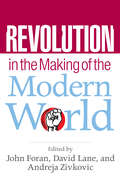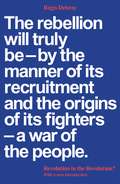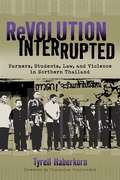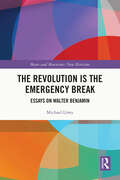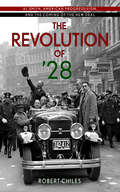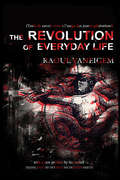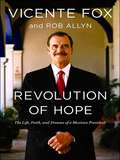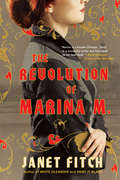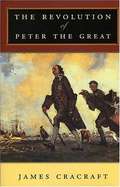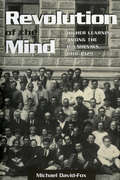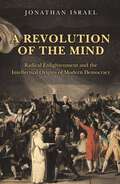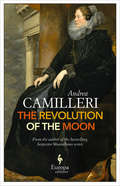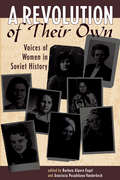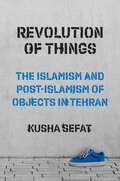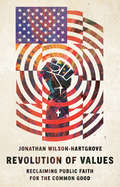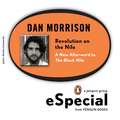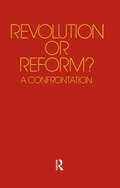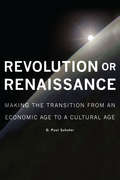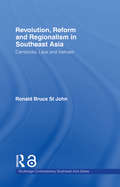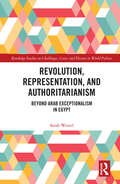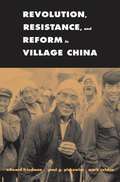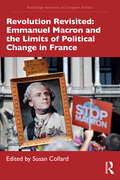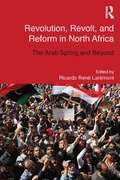- Table View
- List View
Revolution in the Making of the Modern World: Social Identities, Globalization and Modernity
by David Lane John Foran Andreja ZivkovicThis volume questions whether ideas of revolution are still relevant in the postmodern and globalized world of the twenty-first century. Featuring contributions from some of the world's leading sociological and political thinkers on revolution, it combines theoretical concerns with a variety of detailed case studies of individual revolutions. Subjects covered include: democracy and revolution from 1789 to 1989 twentieth century revolutions and theories of revolution, including Marxism, modernization and structuralist theories revolution in the "Third World" and the variable geometry of the paths to modernity Islamic revolutions and modernity the 1989 revolutions as "democratic revolutions" or "elite-led transitions" globalization, the nation-state and revolution empire and "democratic revolution" network society and revolution Islamic fundamentalism, international terrorism and revolution democratic revolution as a new form of revolution postmodern theories of revolution new social movements, identities and new figures of revolution. Revolution in the Making of the Modern World will be essential reading for students and scholars of comparative politics, political theory, revolution and political sociology.
Revolution in the Revolution?
by Regis DebrayRevolution in the Revolution? is a brilliant, pragmatic assessment of the situation in Latin America in the 1960s. First published in 1967, it became a controversial handbook for guerrilla warfare and revolution, read alongside Che’s own pamphlets, and remains fully as important as the writings of Guevara. Lucid and compelling, it spares no personage, no institution, and no concept, taking on not only Russian and Chinese strategies but Trotskyism as well.The year it was published, Debray was convicted of having been part of Guevara’s guerrilla group and sentenced to thirty years in prison. He was released in 1970, following an international campaign, which included appeals by Jean-Paul Sartre, André Malraux, General Charles de Gaulle and Pope Paul VI.
Revolution Interrupted
by Tyrell HaberkornIn October 1973 a mass movement forced Thailand's prime minister to step down and leave the country, ending nearly forty years of dictatorship. Three years later, in a brutal reassertion of authoritarian rule, Thai state and para-state forces quashed a demonstration at Thammasat University in Bangkok. InRevolution Interrupted, Tyrell Haberkorn focuses on this period when political activism briefly opened up the possibility for meaningful social change. Tenant farmers and their student allies fomented revolution, she shows, not by picking up guns but by invoking laws-laws that the Thai state ultimately proved unwilling to enforce. In choosing the law as their tool to fight unjust tenancy practices, farmers and students departed from the tactics of their ancestors and from the insurgent methods of the Communist Party of Thailand. To first imagine and then create a more just future, they drew on their own lived experience and the writings of Thai Marxian radicals of an earlier generation, as well as New Left, socialist, and other progressive thinkers from around the world. Yet their efforts were quickly met with harassment, intimidation, and assassinations of farmer leaders. More than thirty years later, the assassins remain unnamed. Drawing on hundreds of newspaper articles, cremation volumes, activist and state documents, and oral histories, Haberkorn reveals the ways in which the established order was undone and then reconsolidated. Examining this turbulent period through a new optic-interrupted revolution-she shows how the still unnameable violence continues to constrict political opportunity and to silence dissent in present-day Thailand.
The Revolution is the Emergency Break: Essays on Walter Benjamin (Marx and Marxisms)
by Michael LöwyWinner of the 2020 European Walter Benjamin Prize, The Revolution is the Emergency Break is a rich discussion of Walter Benjamin’s lesser-known writings by renowned social scientist Michael Löwy. Translated into several languages but available in English for the very first time, Löwy’s book brings together the philosophical, literary, theological and cultural aspects of Benjamin’s writings, including his relation to figures such as Gershom Scholem and Franz Rosenzweig, his interpretation of historical materialism, surrealism, anti-fascism and anarchism, his contribution to understanding capitalism as a religion, and his relevance for Latin America and ecology today. The concept of revolution in his writings – not only the political ones but also those that deal with art, literature or theology, run through the work, connecting the various chapters. The Revolution is the Emergency Break also features four new chapters in this collection. Written in a clear-eyed, accessible language, The Revolution is the Emergency Break is a must-read for researchers, teachers and students interested in the works of this influential German intellectual.
The Revolution of ’28: Al Smith, American Progressivism, and the Coming of the New Deal
by Robert ChilesThe Revolution of ’28 explores the career of New York governor and 1928 Democratic presidential nominee Alfred E. Smith. Robert Chiles peers into Smith’s work and uncovers a distinctive strain of American progressivism that resonated among urban, ethnic, working-class Americans in the early twentieth century. The book charts the rise of that idiomatic progressivism during Smith’s early years as a state legislator through his time as governor of the Empire State in the 1920s, before proceeding to a revisionist narrative of the 1928 presidential campaign, exploring the ways in which Smith’s gubernatorial progressivism was presented to a national audience. As Chiles points out, new-stock voters responded enthusiastically to Smith's candidacy on both economic and cultural levels.Chiles offers a historical argument that describes the impact of this coalition on the new liberal formation that was to come with Franklin Delano Roosevelt’s New Deal, demonstrating the broad practical consequences of Smith’s political career. In particular, Chiles notes how Smith’s progressive agenda became Democratic partisan dogma and a rallying point for policy formation and electoral success at the state and national levels. Chiles sets the record straight in The Revolution of ’28 by paying close attention to how Smith identified and activated his emergent coalition and put it to use in his campaign of 1928, before quickly losing control over it after his failed presidential bid.
The Revolution of Everyday Life: Aka The Revolution Of Everyday Life
by Raoul VaneigemOne of the most important exponents of Situationist ideas, this treatise presents an impassioned critique of modern capitalism and serves as a cornerstone of modern radical thought. Originally published in early 1968, the book both kindled and colored the May 1968 upheavals in France that captured the attention of the world. In the political climate of today, Raoul Vaneigem's important work of radical anticapitalist thought has struck a new chord with the worldwide Occupy Movement. Naming and defining the alienating features of everyday life in consumer society—survival rather than living in full, the call to sacrifice, the cultivation of false needs, the dictatorship of the commodity, subjection to social roles, and the replacement of God by the economy—the book argues that the countervailing impulses that exist deep within this alienation, such as creativity, spontaneity, and poetry, present an authentic alternative to nihilistic consumerism. This carefully edited new translation marks the first North American publication of this important work and includes a new preface by the author and a translator's note.
Revolution of Hope
by Vicente Fox Rob AllynThe charismatic former president of Mexico offers a candid and provocative perspective on the state of world affairs. As president of Mexico, Vicente Fox brought true democracy to the country after seven decades of one party rule. Elected as a political outsider with a message of honesty, change, and hope, he is truly a hero of democracy, and this vivid book interweaves his inspiring personal story with his hopeful new vision for the future of the Americas. President Fox candidly reveals the ups and downs of his relationships with world leaders from George W. Bush and Tony Blair to Fidel Castro, Vladimir Putin, and Hugo Chávez. He also speaks out on hot global topics such as immigration, the war in Iraq, racism, the United Nations, free trade, and the moral imperative to heal the global divide between rich and poor nations. Outspoken, impassioned, sincere, and engaging, Vicente Fox embodies a quality that seems all too rare in world politics these days-the moral character of a genuine leader.
The Revolution of Marina M.: A Novel (A Novel)
by Janet FitchFrom the mega-bestselling author of White Oleander and Paint It Black, a sweeping historical saga of the Russian Revolution, as seen through the eyes of one young womanOne of Entertainment Weekly's Most Buzzworthy Books of Fall 2017St. Petersburg, New Year's Eve, 1916. Marina Makarova is a young woman of privilege who aches to break free of the constraints of her genteel life, a life about to be violently upended by the vast forces of history. Swept up on these tides, Marina will join the marches for workers' rights, fall in love with a radical young poet, and betray everything she holds dear, before being betrayed in turn.As her country goes through almost unimaginable upheaval, Marina's own coming-of-age unfolds, marked by deep passion and devastating loss, and the private heroism of an ordinary woman living through extraordinary times. This is the epic, mesmerizing story of one indomitable woman's journey through some of the most dramatic events of the last century.
The Revolution Of Peter The Great
by James CracraftMany books chronicle the remarkable life of Russian tsar Peter the Great, but none analyze how his famous reforms actually took root and spread in Russia. In The Revolution of Peter the Great, James Cracraft offers a brilliant new interpretation of this pivotal era. Linking together and transcending Peter's many reforms of state and society, Cracraft argues, was nothing less than a cultural revolution. New ways of dress, elite social behavior, navigation, architecture, and image-making emerged along with expansive vocabularies for labeling new objects and activities. Russians learned how to build and sail warships; train, supply, and command a modern army; operate a new-style bureaucracy; conduct diplomacy on a par with the other European states; apply modern science; and conceptualize the new governing system. Throughout, Peter remains the central figure, and Cracraft discusses the shaping events of the tsar's youth, his inner circle, the resistance his reforms engendered, and the founding of the city that would embody his vision--St. Petersburg, which celebrated its tercentenary in 2003. By century's end, Russia was poised to play a critical role in the Napoleonic wars and boasted an elite culture about to burst into its golden age. In this eloquent book, Cracraft illuminates an astonishing transformation that had enormous consequences for both Russia and Europe, indeed the world.
Revolution of the Mind: Higher Learning among the Bolsheviks, 1918–1929 (Studies of the Harriman Institute)
by Michael David-FoxUsing archival materials never previously accessible to Western scholars, Michael David-Fox analyzes Bolshevik Party educational and research initiatives in higher learning after 1917. His fresh consideration of the era of the New Economic Policy and cultural politics after the Revolution explains how new communist institutions rose to parallel and rival conventional higher learning from the Academy of Sciences to the universities. Beginning with the creation of the first party school by intellectuals on the island of Capri in 1909, David-Fox argues, the Bolshevik cultural project was tightly linked to party educational institutions. He provides the first account of the early history and politics of three major institutions founded after the Revolution: Sverdlov Communist University, where the quest to transform everyday life gripped the student movement; the Institute of Red Professors, where the Bolsheviks sought to train a new communist intellectual or red specialist; and the Communist Academy, headquarters for a planned, collectivist, proletarian science.
A Revolution of the Mind: Radical Enlightenment and the Intellectual Origins of Modern Democracy
by Jonathan IsraelA leading historian reveals the radical origins of humanity's most cherished secular valuesDemocracy, free thought and expression, religious tolerance, individual liberty, political self-determination of peoples, sexual and racial equality—these values have firmly entered the mainstream in the decades since they were enshrined in the 1948 U.N. Declaration of Human Rights. But if these ideals no longer seem radical today, their origin was very radical indeed—far more so than most historians have been willing to recognize. In A Revolution of the Mind, Jonathan Israel, one of the world's leading historians of the Enlightenment, traces the philosophical roots of these ideas to what were the least respectable strata of Enlightenment thought—what he calls the Radical Enlightenment.Originating as a clandestine movement of ideas that was almost entirely hidden from public view during its earliest phase, the Radical Enlightenment matured in opposition to the moderate mainstream Enlightenment dominant in Europe and America in the eighteenth century. During the revolutionary decades of the 1770s, 1780s, and 1790s, the Radical Enlightenment burst into the open, only to provoke a long and bitter backlash. A Revolution of the Mind shows that this vigorous opposition was mainly due to the powerful impulses in society to defend the principles of monarchy, aristocracy, empire, and racial hierarchy—principles linked to the upholding of censorship, church authority, social inequality, racial segregation, religious discrimination, and far-reaching privilege for ruling groups.In telling this fascinating history, A Revolution of the Mind reveals the surprising origin of our most cherished values—and helps explain why in certain circles they are frequently disapproved of and attacked even today.
The Revolution of the Moon
by Andrea CamilleriThe award-winning author of the Inspector Montalbano series explores the political intrigue of seventeenth-century Sicily in this novel based on true events. Sicily, 1677. Just before his death, the viceroy of Spanish-controlled Sicily names his wife Doña Eleonora as his successor. The Holy Royal Council is scandalized by the thought of a woman running the government, and its corrupt councilors will do everything in their power to make her a viceroy in name only. But Eleanora has other plans—and proves herself to be far more cunning and capable than her many adversaries. In a land afflicted with poverty and misery, Eleonora successfully lowers the price of bread, reduces taxes for large families, reopens women&’s care facilities, and establishes stipends for young couples wishing to marry—measures considered to be seditious by the city fathers and the Church. But while she outmaneuvers the powerful men in her path time and time again, Eleonora&’s rule would last only twenty-seven days—one cycle of the moon. Based on a true story, author Andrea Camilleri&’s gripping and richly imagined novel tells the story of a woman whose courage and political vision is tested at every step by a corrupt and ruthless patriarchy.
A Revolution Of Their Own: Voices Of Women In Soviet History
by Barbara EngelThe stories of these eight Russian women offer an extremely rare perspective into personal life in the Soviet era. Some were from the poor peasantry and working class, groups in whose name the revolution was carried out and who sometimes gained unprecedented opportunities after the revolution. Others, born to "misfortune" as the daughters of nobles
Revolution of Things: The Islamism and Post-Islamism of Objects in Tehran (Princeton Studies in Cultural Sociology #23)
by Kusha SefatAn exploration of the ways that shifting relations between materiality and language bring about different forms of politics in TehranIn Revolution of Things, Kusha Sefat traces a dynamism between materiality and language that sheds light on how the merger of the two permeates politics. To show how shifting relations between things and terms form the grounds for different modes of action, Sefat reconstructs the political history of postrevolutionary Iran at the intersection of everyday objects and words. Just as Islamism fashioned its own objects in Tehran during the 1980s, he explains, tyrannical objects generated a distinct form of Islamism by means of their material properties; everyday things from walls to shoes to foods were active political players that helped consolidate the Islamic Republic. Moreover, President Rafsanjani’s “liberalization” in the 1990s was based not merely on state policies and post-Islamist ideologies but also on the unlikely things—including consumer products from the West—that engendered and sustained “liberalism” in Tehran.Sefat shows how provincial vocabularies transformed into Islamist and post-Islamist discourses through the circulation of international objects. The globalization of objects, he argues, was constitutive of the different forms that politics took in Tehran, with each constellation affording and foreclosing distinct modes of agency. Sefat’s intention is not to alter historical facts about the Islamic Republic but to show how we can rethink the matter of those facts. By bringing the recent “material turn” into conversation with the canons of structural analysis, poststructuralist theory, sociolinguistics, and Middle East studies, Sefat offers a unique perspective on Iran’s revolution and its aftermath.
Revolution of Values: Reclaiming Public Faith for the Common Good
by Jonathan Wilson-HartgroveThe religious Right taught America to misread the Bible.
Revolution on the Nile: A New Afterword to The Black Nile: A Penguin eSpecial
by Dan MorrisonA New Afterword to The Black Nile<P> An incisive report from the front lines of South Sudan's freedom referendum. In January 2011, weeks before Arab Spring took the world by storm, millions of Sudanese citizens enacted a democratic uprising of their own. In this addendum to his critically acclaimed book, The Black Nile, foreign correspondent Dan Morrison reports on the South Sudan secession from the ground, offering an unflinching portrait of the ideals, interests, and individual lives wrapped up in the struggle for freedom after decades of dictatorial rule.
Revolution or Reform?: A Confrontation
by Herbert Marcuse Thomas MolnarThis series provides a forum for the critical review of enduring issues concerning ethics and society. The text of the debate between Herbert Marcuse and Sir Karl Popper which follows in this volume raises many important issues. The crucial issues between the two participants are (1) their anthropological-axiological positions with respect to the “nature” of man, society, and the practical functions of democracy as a mode of self-government; (2) the conceptions of science and of philosophy which lie behind each thinker’s claims with respect to these; and (3) their respective conceptions of the means required and feasible for attaining their respective social goals. The remarks which follow will attempt to focus upon, and deal critically with, the problems implicit in these three areas.
Revolution or Renaissance: Making the Transition from an Economic Age to a Cultural Age (Governance Series)
by D. Paul SchaferIn Revolution or Renaissance, D. Paul Schafer subjects two of the most powerful forces in the world – economics and culture – to a detailed and historically sensitive analysis. He argues that the economic age has produced a great deal of wealth and unleashed tremendous productive power; however, it is not capable of coming to grips with the problems threatening human and non-human life on this planet. After tracing the evolution of the economic age from the publication of Adam Smith's The Wealth of Nations in 1776 to the present, he turns his attention to culture, examining it both as a concept and as a reality. What emerges is a portrait of the world system of the future where culture is the central focus of development. According to Schafer, making the transition from an economic age to a cultural age is imperative if global harmony, environmental sustainability, economic viability, and human well-being are to be achieved.
Revolution, Reform and Regionalism in Southeast Asia: Cambodia, Laos and Vietnam (Routledge Contemporary Southeast Asia Series #Vol. 8)
by Ronald Bruce St JohnBased on research carried out over the three decades, this book compares the post-war political economies of Cambodia, Laos and Vietnam in the context of their individual and collective impact on contemporary efforts at regional integration. The author highlights the different paths to reform taken by the three neighbours and the effect this has had on regional plans for economic development through the ASEAN and the Greater Mekong Subregion. Through its comparative analysis of the reforms implemented by Cambodia, Laos and Vietnam over the last thirty years, the book draws attention to parallel themes of continuity and change. The author discusses how the three states have demonstrated related characteristics whilst at the same time making different modifications in order to exploit the unique strengths of their individual cultures. Contributing to the contemporary debate over the role of democratic reform in promoting economic development, the book provides a detailed account of the political economies of three states at the heart of Southeast Asia.
Revolution, Representation, and Authoritarianism: Beyond Arab Exceptionalism in Egypt (Routledge Studies on Challenges, Crises and Dissent in World Politics)
by Sarah WesselThis book examines Egypt’s turbulent and contradictory political period (2011-2015) as key to understanding contemporary politics in the country and the developments in the Arab region after the mass protests in 2010/11, more broadly. In doing so, it breaks new ground in the study of political representation, providing analytical innovation to the study of disenchantment with politics, democracy fatigue and social cohesion. Based on five years of intense fieldwork, the author provides rare insights into local and national ideas on politics, justice and identity, and on how people situate themselves and Egypt in the regional and global context. It analyzes how the creation of an alternate, political system was discussed and negotiated among the Egyptian population, the military, the government, public figures, the media, and international actors, and yet nevertheless today, Egypt has a new political regime that is the most repressive in the countries’ modern history. Finally, it recalls the emotions and perceptions of individuals and collectives and interlinks these local perspectives to national events and developments through time. This book will be of key interest to scholars and students of democratization and authoritarianism, Middle East Studies, political representation and informality, collective action, and more broadly to cultural studies and international relations.
Revolution, Resistance, and Reform in Village China
by Edward Friedman Paul G. Pickowicz Mark SeldenDrawing on more than a quarter century of field and documentary research in rural North China, this book explores the contested relationship between village and state from the 1960s to the start of the twenty-first century. The authors provide a vivid portrait of how resilient villagers struggle to survive and prosper in the face of state power in two epochs of revolution and reform. Highlighting the importance of intra-rural resistance and rural-urban conflicts to Chinese politics and society in the Great Leap and Cultural Revolution, the authors go on to depict the dynamic changes that have transformed village China in the post-Mao era. This book continues the dramatic story in the authors' prizewinningChinese Village, Socialist State. Plumbing previously untapped sources, including interviews, archival materials, village records and unpublished memoirs, diaries and letters, the authors capture the struggles, pains and achievements of villagers across three generations of social upheaval.
Revolution Revisited: Emmanuel Macron and the Limits of Political Change in France (Routledge Advances in European Politics)
by Susan CollardThis book provides timely assessment of the extent to which Emmanuel Macron’s declared presidential goal – to bring in radical transformation of French politics, indeed a revolution, albeit a democratic one – has been achieved.This analysis of his presidency provides a framework for reflection on ‘immobilism’ in French politics, and how enduring transformation has remained much more elusive to most of those who promised it. With a wide a range of underlying, seemingly intractable and unresolved structural issues dominating French society, the book asks whether the young ‘disrupter’ has succeeded in reforming France where others had failed. What can we learn about the processes of political change from analysing Macron’s successes and failures in working through his ambitions for France?This book will be of key interest to scholars, students and followers of French politics/studies and society, gender studies, media studies and more broadly European studies.
Revolution, Revolt and Reform in North Africa: The Arab Spring and Beyond (Routledge Studies in Middle Eastern Democratization and Government)
by Ricardo René LarémontProviding an account of the recent revolutions or reform movements that constituted part of the Arab Spring, this book focuses on these transformative processes in a North African context. Whilst the longer term outcomes of the Arab Spring revolts are not entirely clear, the revolutionary or reform processes in North Africa are further along than the events taking place in Levant or the Arabian Peninsula, elections having now been held in the post-revolutionary/ post-revolt states. Understanding and examining North African events has become critical as the countries in question are part of Mare Nostrum; events in North Africa inevitably have effects in Europe. Using examples from Tunisia, Egypt, Libya, Morocco and Algeria, Revolution, Revolt and Reform in North Africa provides an insider scholar’s account of these recent revolutions or reform movements. One of the first attempts at undertaking an analysis of possible transitions to democracy in the region, this book is a valuable resource for students and researchers with an interest in the Middle East, Political Science or contemporary affairs in general.
The Revolution Starts at Home
by Ching-In Chen Jai Dulani Leah Lakshmi Piepzna-SamarasinhaIn this brilliant and widely acclaimed book, winner of the 1975 National Book Award, Robert Nozick challenges the most commonly held political and social positions of our age-liberal, socialist, and conservative.
The Revolution Takes Form: Art and the Barricade in Nineteenth-Century France
by Jordan Marc RoseDuring the French Revolution of 1830, insurgents raised some four thousand barricades. Afterward, lithographs of the street fighting flowed from the presses, creating the barricade’s first imagery. This book documents the changing political valence of the revolutionary ideals associated with the barricade in France from 1830 to 1852.The Revolution Takes Form coordinates the political reality of the barricade with the divergent ways in which its image gave shape to the period’s conceptions of class, revolution, and urban space. Engaging the instability of the barricade, art historian Jordan Marc Rose focuses on five politically charged works of art: Eugène Delacroix’s La Liberté guidant le peuple, Honoré Daumier’s Rue Transnonain, le 15 avril 1834 and L’Émeute, Auguste Préault’s Tuerie, and Ernest Meissonier’s Souvenir de guerre civile. The history of these artworks illuminates how such revolutionary insurrections were characterized—along with the conceptions of “the people” they mobilized. Foregrounding a trajectory of disillusionment, growing class tensions, and ultimately open conflict between bourgeois liberals and the proletariat, Rose both explains why the barricade became a compelling subject for pictorial reflection and accounts for its emergence as the period’s most poignant and meaningful symbol of revolution.Original and convincing, this book will appeal to students and scholars of art history and, in particular, of the history of the French Revolution.
